
Thank you dear subscribers, we are overwhelmed with your response.
Your Turn is a unique section from ThePrint featuring points of view from its subscribers. If you are a subscriber, have a point of view, please send it to us. If not, do subscribe here: https://theprint.in/subscribe/
Education gives us an ability to choose and practise our vocation in most responsible ways. An impartial process of imparting education is enshrined in the Constitution of India under Article 21-A. This right is entitled to every child in India without any bias. Hence, Surveys conducted on a regular basis with respect to the quality of education provides an input to policy makers about the bottlenecks and stirs them to take measures to alleviate the impediments. Most of us might have heard about the surveys related to No. of School drop outs due to gender, caste, or poverty issues. The point here is not about the loopholes that are identified in surveys but it is about the survey itself that does not accommodates many loopholes in the system. As per the latest statistics of UNESCO, about 8 million children suffer from some kind of disabilities in India and 45 % are not able to receive schooling. Minor investigations are conducted to direct the attention of government to mentally disabled children in India. Data collected from various sources pertains to the children with Autism or Down’s Syndrome, ADHD (Attention Deficit Hyperactivity Disorder) from financially well off families. The information fails to provide an inkling about the status of mentally disabled children in rural and poverty stricken places of the nation.
Every time there is a rift between the haves and the not-haves, the not haves become more conspicuous on the ground. There are not so lucky not-haves in the tussle, who do not have the capability to raise their voice, leave alone mustering attention for their cause. Mental Disability has cause irreparable harm to families and the sufferer alike. A cursory glance at the statistics related to the condition of mentally disabled children indicates that such mentally disabled children are not allowed to get admission in schools. If this is the condition in urban India, speculations are surpassed with certainty about the deplorable situation of such children in India.
That which gains momentum, gains movement
Most educated and creamy layer of Indian Citizen are not aware about the adversity and challenges faced by mental disabled children. The question here is not about sensitization of the issue about the rights of mentally disabled children, which has gained a slim momentum, but it is also about the actions taken to promote the availing of opportunities to all the children irrespective of their living standards. The welcome move made by NGO like Auspice [SOCIAL INNOVATION FOR FOOD], which provides employment opportunities to Autistic children, by training them to make food spices and ingredients, deserves special attention from policy makers and CSR units. Organizations like Auspice could be tied up with schools to dispense employment opportunities to children with special needs post their basic level of education. When action and contributions shake hands to fight for this noble cause, transformation succeeds all levels. Media sensitizing the status of mentally challenged children in rural areas could at least form the background for a change to happen. Special schools should be established not only in urban areas on the basis of making a profitable business, but it should also cater to the root problem in rural areas. Teachers training for highly passionate and motivated candidates could be framed through scholarships. This will ensure that when people fight for a cause, the government and CSR units ensures their sustenance as well. Mentally challenged students in rural set up schools could be provided with fee-waiver, which in turn would encourage their guardians to send them to school. Special amenities provided to medical professionals in rural set up would incorporate the fabric of motivation and dedication amongst the professionals. Technological tools or app, fulfilled with practical ideas to help mentally disabled children, could serve as an anchoring for both urban and rural set schools, in realizing their aspirations.
Special future for the special and the normal
No-one fails in life until one fails in embracing the design of humanity. We are not empowered to see our future but we have freedom to design our future. Moral sense of designing the future relies on every citizen, the normal ones for supporting the cause of empowerming children with special needs, and the special ones for making the future through cooperation, support and care. A Socially inclusive nation results from the well-being of all its citizens, be it normal or special.
These pieces are being published as they have been received – they have not been edited/fact-checked by ThePrint.
Also read: SubscriberWrites: It’s time to give domestic migrant workers their due

COMMENTS